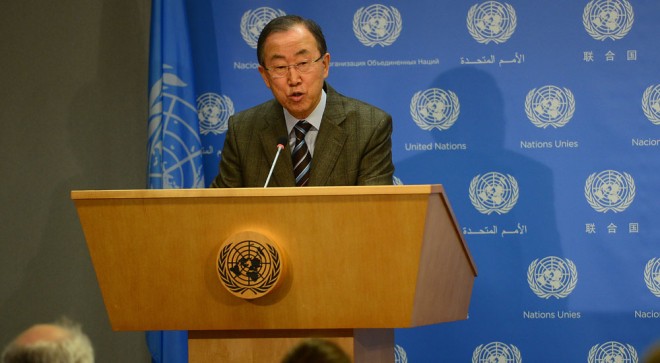
In this Jan. 19, 2014, photo provided by the United Nations, UN Secretary-General Ban Ki-moon briefs correspondents at the UN headquarters in New York on the decision by the National Coalition of Syrian Revolution and Armed Forces to participate in the upcoming Geneva Conference on Syria. Ban on Monday, Jan. 20, abruptly excluded Iran from this week’s Syria peace conference after it refused to back calls for a transitional government to end the country’s war. AP
UNITED NATIONS—UN leader Ban Ki-moon on Monday abruptly excluded Iran from this week’s Syria peace conference after it refused to back calls for a transitional government to end the country’s war.
Ban withdrew a surprise invitation to Iran less than 24 hours after it had been made, bidding to save the talks which start in the Swiss town of Montreux on Wednesday.
The UN secretary general was forced to act after the Syrian opposition threatened to withdraw from the talks if Iran takes part. The United States also demanded the invitation be withdrawn if Iran did not support a Syria declaration adopted by major world powers in Geneva in 2012.
Iran is a major backer of Syrian President Bashar al-Assad, who reaffirmed that he would not stand down in an interview with AFP published Monday.
The Geneva declaration had called for a transitional government to guide the country out of the three-year war, which the United Nations says has left well over 100,000 dead.
The UN leader said Iran’s Foreign Minister Javad Zarif had repeatedly assured him that he “understood and supported” the aim of the peace conference to set up an interim government.
“The secretary general is deeply disappointed by Iranian public statements today that are not at all consistent with that stated commitment,” said UN spokesman Martin Nesirky.
“He continues to urge Iran to join the global consensus behind the Geneva communique.
“Given that it has chosen to remain outside that basic understanding, he has decided that the one-day Montreux gathering will proceed without Iran’s participation,” Nesirky added.
Ban was “dismayed” by the storm growing around the peace conference, the most intense diplomatic bid yet to end the near three-year war.
UN officials said Zarif had apparently promised Ban a statement accepting the Geneva communique would be made.
But just before the UN announcement, Iran’s envoy to the United Nations, Mohammad Khazaee, reaffirmed his government’s rejection of conditions for attending this week’s meeting.
“Iran has always been supportive of finding a political solution for this crisis,” Khazaee said in a statement.
“If the participation of Iran is conditioned to accept Geneva I communique, Iran will not participate in Geneva II,” he added.
Ban had contacts with the US and Russian foreign ministers before excluding Iran again.
The Syrian National Coalition, the main opposition, welcomed Ban’s about turn and said it would be in Switzerland this week.
Although the talks start in Montreux on Wednesday, the Syrian government and opposition will start talks in Geneva on Friday.
The conference still faces major obstacles which were highlighted by new attacks spilling over into Syria’s neighbors and Assad’s refusal to consider standing down—a key demand of the Syrian opposition.
Car bombing kills 16
A double suicide car bombing at a border post controlled by moderate Islamist rebels between Syria and Turkey killed at least 16 people on Monday, a monitoring group said.
And adding to the tensions, Assad bluntly ruled out a power-sharing deal in an AFP interview. He insisted that the peace conference should focus on what he called his “war against terrorism.”
Assad adopted a combative tone, dismissing the opposition as having been “created” by foreign backers and saying he saw no reason he should not seek a new term as president in an election he wants to hold in June.
The Syrian opposition, the United States and European powers have all said Assad cannot be part of any future Syria.
A US official said Washington had received messages from members of the Damascus regime keen to find a peaceful solution to the conflict.
The United States hoped the peace conference would provide “an impetus” out of the bloodshed, the State Department official said.
“There are elements inside the regime itself, among its supporters, that are anxious to find a peaceful solution, and we’ve gotten plenty of messages from people inside, they want a way out,” the official told reporters.
But the dispute over Iran and Assad’s future is likely to spill over into the Geneva talks, diplomats said.
Russia, a key sponsor of the talks and also an Assad ally, said Iran’s absence would be an “unforgivable mistake.”
The United States indicated, however, that Ban had no alternative but to withdraw Iran’s invitation.
“We are hopeful that, in the wake of today’s announcement, all parties can now return to focus on the task at hand, which is bringing an end to the suffering of the Syrian people and beginning a process toward a long overdue political transition,” said US State Department spokeswoman Jen Psaki.—Timothy Witcher